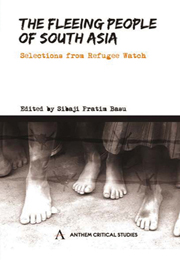Book contents
- Frontmatter
- Contents
- Acronyms and Abbreviations
- Foreword by Ranabir Samaddar
- Preface
- ETHICAL ISSUES
- LAWS
- SOUTH ASIA
- INDIA
- Introduction
- Population Displacement in India: A Critical Overview
- Reporting from Gagan Geer: A Kargil War Refugee Camp
- Barricaded Kashmiri Pandits Letting Go the Right to Return?
- Homeless and Divided in Jammu and Kashmir
- Internal Displacement in North-East India: Challenges Ahead
- The North-East Today: Displacing Identities, Displaced Identities
- Tibetan Refugees in India: Surviving in Exile
- Unrest and Displacement: Rajbanshis in North Bengal
- Adivasis in Coal Mining
- GENDER
- INTERVIEW/CORRESPONDENCE
- REPRESENTATIONS
- Index
Adivasis in Coal Mining
from INDIA
Published online by Cambridge University Press: 05 March 2012
- Frontmatter
- Contents
- Acronyms and Abbreviations
- Foreword by Ranabir Samaddar
- Preface
- ETHICAL ISSUES
- LAWS
- SOUTH ASIA
- INDIA
- Introduction
- Population Displacement in India: A Critical Overview
- Reporting from Gagan Geer: A Kargil War Refugee Camp
- Barricaded Kashmiri Pandits Letting Go the Right to Return?
- Homeless and Divided in Jammu and Kashmir
- Internal Displacement in North-East India: Challenges Ahead
- The North-East Today: Displacing Identities, Displaced Identities
- Tibetan Refugees in India: Surviving in Exile
- Unrest and Displacement: Rajbanshis in North Bengal
- Adivasis in Coal Mining
- GENDER
- INTERVIEW/CORRESPONDENCE
- REPRESENTATIONS
- Index
Summary
INTRODUCTION: NO ALTERNATIVE?
A 1984 quote of Indira Gandhi in her letter to Baba Amte:
I am most unhappy that development projects displace tribal people from their habitats, especially as project authorities do not always take care to properly rehabilitate the affected population. But sometimes there is no alternative and we have to go ahead in the larger interest […]
Displacement, forcible eviction and dispossession are undeniable realities of life in the coal mining regions of India. Large-scale acquisition of land is the most important driver of this displacement; the Indian constitution, courts and government justify themselves in the name of ‘public good’, as evident in the following statement of the Supreme Court:
The power to acquire private property for public use is an attribute of sovereignty and is essential to the existence of a government. The power of eminent domain was recognized on the principle that the sovereign state can always acquire the property of a citizen for public good, without the owner's consent. […] The right to acquire an interest in land compulsorily has assumed increasing importance as a result of requirement of such land more and more everyday, for different public purposes and to implement the promises made by the framers of the Constitution to the people of India.
The ‘eminent domain’ concept that the Indian Constitution follows gives ‘the highest and most exact idea of property remaining in the government, or in the aggregate body of the people in their sovereign capacity’.
- Type
- Chapter
- Information
- The Fleeing People of South AsiaSelections from Refugee Watch, pp. 283 - 294Publisher: Anthem PressPrint publication year: 2009



